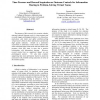Free Online Productivity Tools
i2Speak
i2Symbol
i2OCR
iTex2Img
iWeb2Print
iWeb2Shot
i2Type
iPdf2Split
iPdf2Merge
i2Bopomofo
i2Arabic
i2Style
i2Image
i2PDF
iLatex2Rtf
Sci2ools
HICSS
2007
IEEE
2007
IEEE
Time Pressure and Reward Inspiration as Outcome Controls for Information Sharing in Problem-Solving Virtual Teams
The purpose of this research is to examine whether outcome controls of group work (i.e. time pressure and reward) trigger psychological factors (i.e. distraction, motivation, and trust) and affect problem-solving virtual teams’ ability to share information and develop high quality solutions. Results of a laboratory experiment on GSS-based virtual teams indicate that teams exhibited higher motivation and trust under time pressure while only trust, in turn, has a positive relationship with information sharing. However, reward control has no significant impact on any psychological factors. We also find evidence supporting that total information shared is positively associated with problem-solving outcomes in terms of the solution quality.
| Added | 02 Jun 2010 |
| Updated | 02 Jun 2010 |
| Type | Conference |
| Year | 2007 |
| Where | HICSS |
| Authors | Fang He, Souren Paul |
Comments (0)

